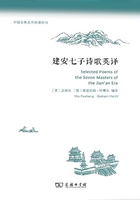
思亲诗
为潘文则作
穆穆显妣,
德音徽止。
思齐先姑,
志侔姜姒。
躬此劳瘁,
鞠予小子。
小子之生,
遭世罔宁。
烈考勤时,
从之于征。
奄遘不造,
殷忧是婴。
咨予靡及,
退守祧祊。
五服荒离,
四国分争。
祸难斯逼,
救死于颈。
嗟我怀归,
弗克弗逞。
圣善独劳,
莫慰其情。
春秋代逝,
于兹九龄。
缅彼行路,
焉托予诚。
予诚既否,
委之于天。
庶我显妣,
克保遐年。
亹亹惟惧,
心乎如悬。
如何不吊,
早世徂颠。
于存弗养,
于后弗临。
遗愆在体,
惨痛切心。
形景尸立,
魂爽飞沈。
在昔蓼莪,
哀有余音。
我之此譬,
忧其独深。
胡宁视息,
以济于今。
岩岩丛险,
则不可摧。
仰瞻归云,
俯聆飘回。
飞焉靡翼,
超焉靡阶。
思若流波,
情似坻颓。
诗之作矣,
情以告哀。
Thinking of My Late Mother
Written on Behalf of Pan Wenze
Dignif ied and distinguished was my late mother,
beautiful both her virtue and her fame!
In thought she was equal to the ancient matriarchs,
and in will comparable to Jiang and Si1.
She labored to her exhaustion
to nurture me, her little son.
When her little son was born
the world was not at peace.
My late father labored hard,
and I followed him on the road.
Suddenly, a disaster struck,
And I was besieged by a deep sorrow. 2
Endlessly I sigh and lament my loss,
back at our ancestral home.
People were scattered to the border regions,
as different states fought one another.
Catastrophes closed in everywhere,
your life may be saved with the blade at your neck.
How I longed to go home,
but my wish was not to be granted.
Alone my virtuous mother labored,
with no one there to console her.
Spring and autumn pass in turn,
it has been nine years.
Long were the roads to travel,
where was I to entrust my heart?
With no means to convey my feelings,
I left it up to Heaven,
hoping that my distinguished mother
would live for many years.
I spent my days in constant fear,
as if my heart was hanging in suspense.
What a cruel fate it was
that she was felled by early death!
In her life I failed to look after her,
At her death I was not there to mourn.
The guilt is left in my body,
piercing and cutting my heart.
My shadow stands like a corpse,
my soul flies and dives in loss.
The ancient “Tarragon” poem 3
lingers in me with its melancholy tone;
its relevance with me
is especially sad and deep.
How could I even see and breathe
until this day?
On those craggy mountains dangers pile up,
they cannot be scaled.
I look up at the returning clouds,
and bend to listen to the roaring wind.
I wish to fly, but have no wings,
and want to climb, but f ind no footholds.
My thought is like the flowing waters,
my feelings are like the crumbling slopes.
Thus I write this poem
to tell of my grief.
1 Jiang and Si refer to the wives of the Great King of Zhou and King Wen of Zhou. “In Thought Equal” is the title of a poem in The Book of Poetry, which praises these ancient women. “姜姒”指周太王妃太姜和周文王妃太姒。“思齐”是《诗经·大雅》中一首诗的篇名。
2 Namely, the death of his father. 这里指其父之死。
3 “Tarragon” is a poem in The Book of Poetry about a son’s guilt for having failed to look after his parents. 《蓼莪》为《诗经》中的一首诗,其主题是孝子不得终养父母。